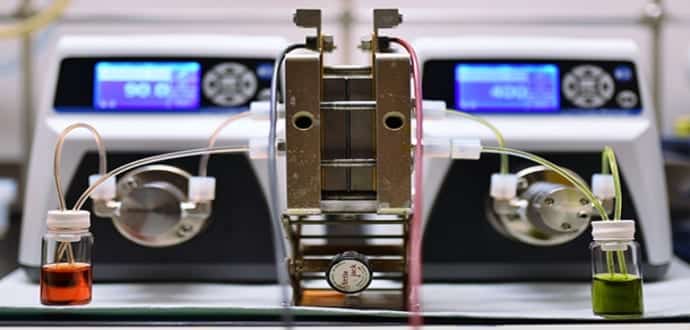Battery issues? No problem, this new renewable Flow Battery can last for a full 10 years
While we have moved from basic cell phones to feature phones and now smartphones, one thing has remained constant. Ditto for laptops which have seen doubling of processing power but the Lithium-Ion charging bot smartphones, laptops and other gadgets like cameras have remained more or less like they were 10 years ago. In fact, the further development of these gadgets has been stuck for want of more power or rather uninterrupted power. If all things go according to the plan of Harward University researchers, we could see a new Flow Battery which would power any device for a full 10 years before need a recharge.
Researchers at Harvard University have developed a new liquid flow battery that uses organic structures for power that could potentially help it last for a decade. Currently “flow batteries” store energy in a liquid and wear out rapidly when used regularly.
Developed by a team at the Harvard John A. Paulson School of Engineering and Applied Sciences (SEAS), the battery stores organic molecules dissolved in neutral pH value water. According to the researchers, the new battery can run for a decade or more without maintenance.
“Because we were able to dissolve the electrolytes in neutral water, this is a long-lasting battery that you could put in your basement,” said lead author Roy Gordon, the Thomas Dudley Cabot Professor of Chemistry and Professor of Materials Science. “If it spilled on the floor, it wouldn’t eat the concrete and since the medium is noncorrosive, you can use cheaper materials to build the components of the batteries, like the tanks and pumps.”
Apparently, this ensures a long lifespan due to the water’s lack of toxicity and corrosiveness.
“Lithium ion batteries don’t even survive 1000 complete charge/discharge cycles,” says Michael Aziz, one of the researchers on the project. “Lithium ion batteries are the standard energy source for many modern electronics.”
Flow tanks work on a simple size principle – the bigger the better. In simple words, bigger tanks store more energy.
The new creation could provide us with non-corrosive, non-toxic batteries which are cheaper to produce than today’s batteries, as well as having a considerably longer lifetime of approximately 10 years.
This flow battery could also greatly cut costs. It could also meet the United States Department of Energy’s target of a battery that can store energy for less than $100 per kilowatt-hour, as this would make renewable energy competitive with energy produced from traditional power plants.
“If you can get anywhere near this cost target then you can change the world,” Aziz says. “It becomes cost effective to put batteries in so many places. This research puts us one step closer to reaching that target.”
The research was published in ACS Energy Letters.

